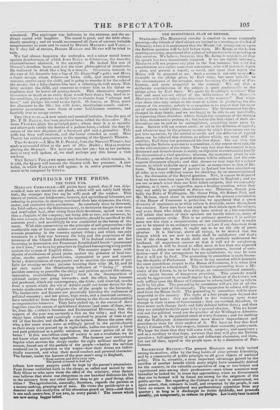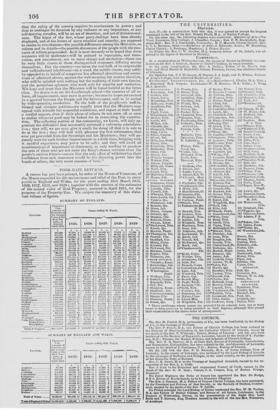'THE AHNISTERIAL PLAN OW REFORM.
STANDARD—The Ministerial circular is couched in terms extremely pressing—the friends of the Cabinet are invited to a meeting, on the 3rd of
February, when it is understood that the Ministerial arrangements upon
the Reform question rvill be laid before them. Mr. Kemp, at tine Lewes meeting yesterday, menti oned that a plan of reform WIIS to be pr posed upon' this occasion. We believe, however, that 311.. Kemp is mistaken, or that Iris speeds has been inaccurately reported. If we are rightly informed, 31inisters will not propose any plan in the first instance, init,I;n:1,eisi-L:ttsiet consideration to a rather numerous committee, who will mann' a plan, and present a report, as usual, and upon that report the House will be prepared to tict. Such a course is not only more nestle formable to the pledge given by Earl Grey, but more suitahlv to the circumstances of the occasion, more becoming the dignity of Par- liament, and nsore respectful to the country. We say that a deliberate consideration of the subject is snore connemalde to the pledge given by Earl Grey. We quote his Lordship's words—“ The first and most earnest object of the deliberatious of his Majesty's Ministers will be to relieve the distresses of the country." Now what- ever share men may assigns to tine want of reform inn pcoducing the dis. tresses of the country, nobody is so sanguine as to expect that the mere act of reform would relieve those distresses. The Government has dis- charged its duty firmly, and we are happy to be able to say mercifully, in repressing those disorders which, though but symptoms of the distress at first, threatened to prolong it ;. but before this first object of their de- liberations can be said to be accomplished, something more must be done. Reform will not restore credit, or aid in the diffusion of capital ; and whatever may be the primary measure by which these means elm be pot into operation, by the revival of credit and the diffusions of capital alone can be relieved that distress, to relieve which, we must still re- member, Earl Grey has pronounced his first object. We say that the referring the Reform questions to aconsmittee, is the course most suitable to tine circumstances of tine times. The very Iltet that the country is in a distressed and disturbedstate is surely an objection to entertaining hastily the discussion of a vital question ; whereas, the assurances given by the Premier, promise that the general distress will be relieved, ;old the con- sequent discontent allayed ; and that thence we Islay hope fur a rainier season, inn which to decide upon a question so momentous as that of Re- form. The iseated temper of parties in Ireland has been admitted on all sides as a very sufficient reason for checking, by an unconstitutional law, the discussions of the Repeal question. -Now, it catmint be disputed that we have some heat upon the Reform question in England ; urtl we are not so much wiser than our Irish fellow-subjects, that we can safely legislate, as it were, ex improtstso, upon a heating question, when they may not safely be permitted to discuss one. Moreover, though pro- bably the Duke of Wellington, Mr. Grove Price, Sir Robert Peel, and Mr. Holmes, stand alone in maintaining that the present constitution of the House of Commons is perfection; we apprehend that a -great diversity of sentiment as to what reform is desirable, exists throughout the country. Many men have not made up their minds upon the suhject, and even those wino think that they have arrived at a fair conclusion will admit that many of their opinions are hastily taken up, many of their conceptions crude. This is no ordinary questions ; it is neither more nor less than a reconstruction of 'our constitution, and it ought not to be treated in an ordinary manner ; at least if any departure from common rules take place, it ought not to be on the side of preci- pitation. It is likewise, above all things, to be desired that the change which we are now to make shall be satisfactory and final ; but if the change to be made shall not be perfectly understood be- forehand, all experience assures us that it will not be Satisficiory.. In operation it will be found to effect more or less than wits expected from it ; in either case we shall have disappointment, instead of satis- faction—and if the arrangement be not satisfactory, we may be sure that it will not be final. The proceeding by committee is more becom- ing the dignity of Parliament. If there be any occasion which deMands the most punctilious respect to the House of Commons, it is when that body is invited to reform itself. The invitation proceeding front a Mi- nister of the Crown, is, in its best shape, an. unconstitutional 'anomaly, which might become of dangerous precedent. This anomaly would surely be aggravated inn no snsall degree by a Minister of the Crown not only calling upon the House of Commons to reform itself, but to reform itself by his plan. • The proceeding by committee will gn rid of all the most offensive part of this anomaly. The suggestion to reform will pro- ceed from the House itself. The proceeding by committee will he more respectful to the country. The right of a free people goes beyond the having good laws : they are entitled to due -warning upon- every change in their system of Government ; they are entitled, therefore, to have every such change fairly and fully debated before them ; and then they are entitled to decide upon it by nr general elections. This we know was not the political creed nor the practice of the Wellington Adminis- tration, but it is the political creed of every freeman ; and for nothing- did the Wellington Administration more deserve iinpeachment and punishment than for their neglect of it. We have no fear that Earl Grey's Cabinet will, in this respect, imitate their unworthy predecessors. We hope for them that they will scorn trick, surprise, and conspiracy ; and as a corollary to that hope, we trust that they will give the Reform question a full opportunity of calm and deliberate discussion, and then, but not till then, appeal to the people upon. it by a dissolution of Par- liament.
Eprernunott REVIEW—The present Ministers are firmly united among themselves, alike by the long habits of close private friendship, and by a community of public principle on all great objects- of national polity. This is, certainly, a most important advantage gained by the sacrifice of another benefit which many might have reasonably desired for the country, in the valuable co-operation of one or two honest and experienced men among their predecessors—men whose accession may hereafter be looked for in times fast approaching, when no Government that can be formed will be found too strong for the exigences of the public service. But regarding the Cabinet as it now is constructed, we again assert, that, compact in itself, and respected by the people, it can have no reason to apprehend any parliamentary opposition from any quarter ; as long as it discharges its duties faithfully, and proceeds steadily, yet temperately, to redeem its pledges. Let It only bear mound that the safety of the country requires its continuance in power ; and that to endanger its duration by any rashness or any impatience, or any self-denying scruples, will be an act of desertion, and not of disinterested- ness. The hopes of the few, whose party-feelings have been already displayed, and of the lovers of mere mischief and anarchy, are supposed to centre in two chances-the possible differences among the Ministers, on reform and its details-the possible discontent of the people with the mea- sures of reform propounded. As it is most devoutly to be hoped that these measures will be moderate-will be pointed to reparation, and resto- ration, and amendment, not to mere change and revolution-there can be very little chance of those distinguished statesmen differing among themselves. But the country-we mean the real bulk of its respectable and well-informed inhabitants-in a word, the middle classes, may safely be appealed to in behalf of temperate but effectual alterations and correc- tions of admitted abuses, against the well-meaning but unwise theorists, who will be satisfied with nothing but the realizing of their own fancies, and the pernicious agitators who work only for anarchy and confusion. We Lope and trust that the Ministers will be found hateful to the latter class. Its desire is to see the Castlereagh school-the enemies of all re- form, all improvement, once more in power ; because its hopes are centred in a quarrel between the People and the Government, only to be settled by wide-spreading revolution. To the bulk of the people-its well-in- formed and virtuous portion-we equally trust that the Ministers may appeal with friendly but respectful confidence, and expect at their hands a cordial support, even if their plans of reform do not seem all at once to realize whatever good may be looked for in renovating the constitu- tion. The reflecting portion of the community, we know, will duly ap- preciate the difficulties that necessarily surround a reforming administra- tion? they will, we are sure, give it credit for doing all that it is safe to do at the first ; they will hail with pleasure the first reformation that ever yet proceeded from the Sovereign and his Ministers ; they will pa- tiently wait for such further improvements as a little time, bringing with it needful experience, may prove to he.safe ; and they will avoid all manifestations of impatience or discontent, as only tending to paralyse the arm of those who are not more the King's chosen servants than the people's ancient friends-aware that the only effect of withdrawing their confidence from such statesmen would be the throwing power into the hands of others, the very worst enemies f both."



























 Previous page
Previous page